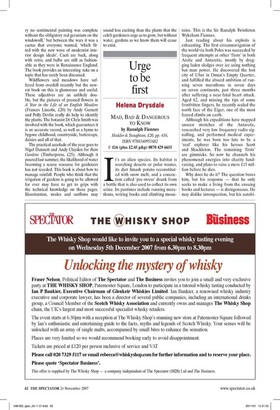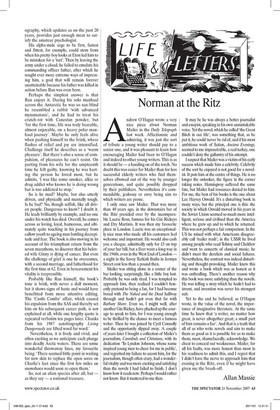Urge to be first
Helena Drysdale MAD, BAD & DANGEROUS TO KNOW by Ranulph Fiennes Hodder & Stoughton, £20, pp. 416, ISBN 9780340951682 £16 (plus £2.45 p&p) 0870 429 6655 1 t's an alien species. Its habitat is scorching deserts or polar wastes, its diet Smash potato reconstituted with snow melt, and a concoction called 'pre-stress' drunk from a bottle that is also used to collect its own urine. Its pastimes include running marathons, writing books and climbing mountains. This is the Sir Ranulph Twistleton Wykeham Fiennes.
Just reading about his exploits is exhausting. The first circumnavigation of the world via both Poles was succeeded by frequent attempts at other 'firsts' in both Arctic and Antarctic, mostly by dragging laden sledges over ice using nothing but man power. He discovered the lost city of Ubar in Oman's Empty Quarter, and fulfilled the absurd ambition of running seven marathons in seven days on seven continents, just three months after suffering a near-fatal heart attack. Aged 62, and missing the tips of some frostbitten fingers, he recently scaled the north face of the Eiger, one of the most feared climbs on earth.
Although his expeditions have mapped unseen stretches of the Antarctic, researched very low frequency radio signalling, and performed medical experiments, he was born too late to be a 'real' explorer like his heroes Scott and Shackleton. The remaining 'firsts' are gimmicks. So now he channels his phenomenal energies into charity fundraising, and plans to raise a mere £15 million before he dies.
Why does he do it? The question bores him, but his response — that he only seeks to make a living from the ensuing books and lectures — is disingenuous. He may dislike introspection, but his autobiography, which updates us on the past 20 years, provides just enough meat to satisfy the amateur psychologist.
His alpha-male urge to be first, fastest and fittest, for example, could stem from when his pretty-boy looks at Eton led him to be mistaken for a `tart'. Then by leaving the army under a cloud, he failed to emulate his commanding officer father, after which he sought ever more extreme ways of impressing him, a goal that will remain forever unattainable because his father was killed in action before Ran was even born.
Perhaps the simplest answer is that Ran enjoys it. During his solo manhaul across the Antarctic he was so sun-blind he resembled a rabbit 'with advanced myxamatosis', and he had to treat his crutch-rot with Canestan powder, but 'for the first time, life was truly bearable, almost enjoyable, on a heavy polar manhaul journey'. Maybe he only feels alive when pushing himself to the brink, where flashes of relief and joy are intensified. Challenge itself he describes as a 'warm pleasure'. But there's also a sense of compulsion, of pleasures he can't resist. On parting from his wife for the umpteenth time he felt guilty, knowing he was hurting the person he loved most, but he admits, 'I was like some smoker, alkie or drug addict who knows he is doing wrong but is too addicted to stop.'
So is he mad? Maybe, but also utterly driven, and physically and mentally tough. Is he bad? No, though selfish, like all driven people. Dangerous to know? I doubt it. He leads brilliantly by example, and no one under his watch has died. Overall, he comes across as loving, loyal, humorous, and ultimately quite touching in his journey from callow youth to ageing man battling decrepitude and fear. The book is also moving in its account of his triumphant return from the seven marathons, to discover that his beloved wife Ginny is dying of cancer. But even the challenge of grief is one he overcomes, with a second marriage, and fatherhood for the first time at 62. Even in bereavement his vitality is irrepressible.
Probably like Ran himself, the book's tone is brisk, with never a dull moment, but it shows signs of haste and would have benefitted from more attentive editing. The 'Castle Combe' affair, which caused his expulsion from the SAS and thereby set him on his subsequent career path, is not explained at all, while one lengthy quote is repeated verbatim ten pages later. Chunks from his 1987 autobiography Living Dangerously are lifted word for word.'
Nevertheless, it is lively and vivid, and often exciting as we anticipate each plunge into deadly Arctic waters. There are some wonderful throwaway lines, my favourite being: 'There seemed little point in waiting for new skin to replace the open sores on Charlie's feet since the first few miles on snowshoes would soon re-open them.'
So, not an alien species after all, but — as they say — a national treasure.







































































 Previous page
Previous page